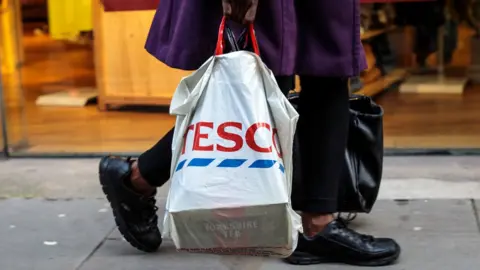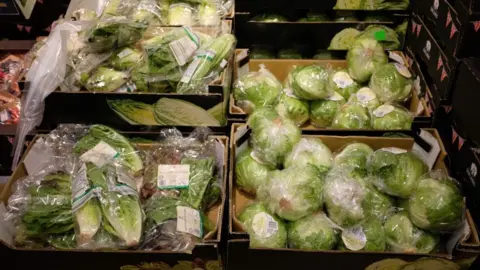Plastic waste rises as 1.5bn 'bags for life' sold, research finds
 Getty Images
Getty ImagesSales of "bags for life" rose to 1.5bn last year as the amount of plastic used by supermarkets increased to 900,000 tonnes, Greenpeace research has found.
Campaigners are calling for higher charges for the bags or a complete ban as the research showed households bought an average of 54 a year.
In 2016, there were 2bn single-use bags sold. Bags for life must be used four times to be better for the environment.
Retailers say they have reduced plastic packaging for their own-brand products.
In their second annual study of plastic use by UK supermarkets, Greenpeace and campaigning charity the Environmental Investigation Agency conclude the rising sales of bags for life mean they are used as a disposable option by many customers.
Many supermarkets have stopped selling 5p single-use bags altogether in favour of stronger 10p bags, which are intended to be reused.
A study by the Environment Agency concluded that these plastic bags for life needed to be used at least four times to ensure they contributed less to climate change than the lighter, single-use bags.
The Greenpeace and EIA research says that bag for life sales were cut by 90% in the Republic of Ireland by setting higher prices of 70 cents. The report recommends a charge of 70p or "ideally" a government ban.
The research also found that overall supermarket plastic use has risen to more than 900,000 tonnes in 2018, despite pledges by retailers to cut down on packaging.
The previous year, they used 886,000 tonnes of single-use plastic packaging.
Ultimatum on plastic
Fiona Nicholls, ocean plastics campaigner for Greenpeace UK, said: "Supermarkets are failing on plastics and failing their customers.
"We hear piecemeal supermarket announcements on plastic every other week, but in reality they are putting more plastic on the shelves than ever."
The report found that supermarkets had slightly reduced the plastic from own-brand goods but that packaging from branded goods increased.
 Getty Images
Getty ImagesOnly Tesco has given suppliers an ultimatum to cut plastic use or see their products removed from the shelves.
The report ranked the supermarkets by their progress on reducing plastic and their future plans.
Challenging targets
Waitrose was ranked top for cutting its packaging and trying out refill stations for products such as coffee, rice, pasta, wine and detergent.
Morrisons came second and was praised for setting a quantified target to increase reusable and refillable packaging, as well as making its loose and refillable products 10% cheaper than packaged alternatives.
The British Retail Consortium, which represents major supermarkets and other shops, said retailers achieved a drop in their own-brand plastic use by removing all polystyrene packaging and plastic cutlery as well as trialling refillable options.
But Andrew Opie, director of food and sustainability, said "more needs to be done" and supermarkets have set "challenging" targets with the aim of making all packaging 100% reusable, recyclable or compostable.
